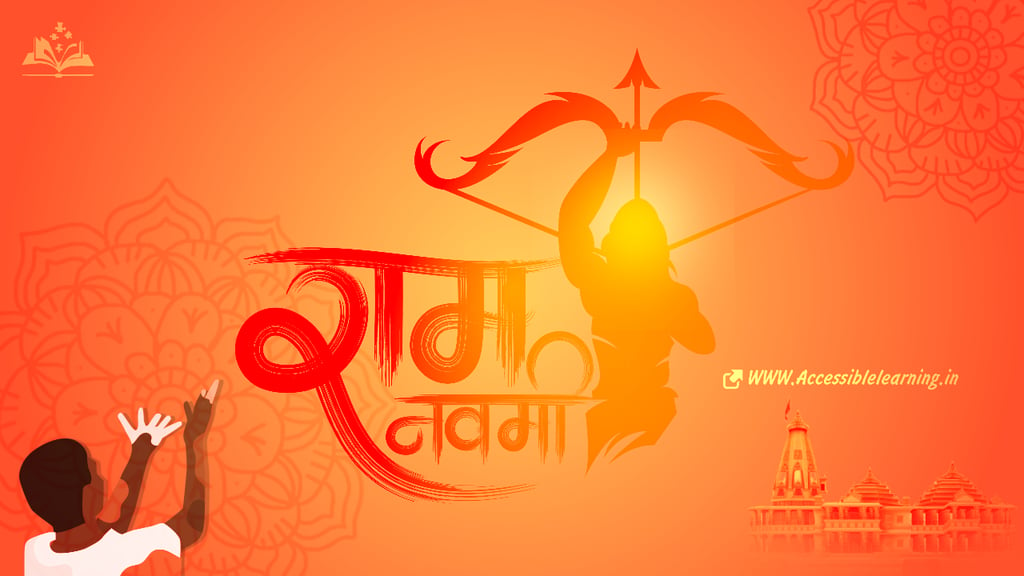
Ram Navami: The Divine Celebration of Ram Ji’s Birth
Discover the significance, rituals, and cultural impact of Ram Navami, the grand festival celebrating the birth of Ram Ji. Explore its historical roots, regional variations, and modern-day celebrations in this in-depth guide.
CULTURE/TRADITIONINDIA/BHARATCELEBRATION/FESTIVALS
Keshav Jha
4/2/20253 min read


Ram Navami is one of the most auspicious Hindu festivals, celebrated with great devotion across India and in many parts of the world. It marks the birth anniversary of Ram Ji, the seventh incarnation of Lord Vishnu. Observed on the ninth day (Navami) of Chaitra month in the Hindu lunar calendar, Ram Navami usually falls in March or April.
Significance of Ram Navami
Ram Ji is revered as the epitome of righteousness (Dharm), virtue, and kingly ideals. His life, as narrated in the epic Ramayan, teaches the values of truth, devotion, and the victory of good over evil. Devotees celebrate this day to honor his birth and to seek his blessings for a prosperous and virtuous life.
Historical and Mythological Background
According to Hindu mythology, Ram Ji was born to King Dasharatha and Rani Kaushalya in Ayodhya, a city in present-day Uttar Pradesh, India. His birth fulfilled a divine prophecy to destroy the demon king Ravan and restore Dharma (righteousness) on Earth. The Ramayana, composed by Maharishi Valmiki, chronicles Rama’s life, exile, struggles, and ultimate triumph over evil.
Ram Navami is also considered an occasion to reflect on Ram Ji’s virtues—obedience, humility, and unwavering devotion to duty. Many devotees believe that chanting his name or reading the Ramayana on this day brings peace and prosperity.

Rituals and Traditions
Fasting and Pooja (Worship)
Many devotees observe a day-long fast on Ram Navami. Some keep a ‘nirjala’ fast, abstaining from both food and water, while others consume fruits and milk. The fast is broken only after offering prayers to Ram Ji.
Temples are adorned beautifully, and special pujas are conducted, including chanting of the ‘Ramayan’ and recitation of ‘Ram Raksha Stotra.’ Devotees visit temples, offer flowers, fruits, and sweets to Ram Ji’s idol, and sing devotional songs in his praise.
Bhajan and Kirtan
Devotional songs and kirtans dedicated to Ram Ji are organized in temples and households. Bhajans like ‘Shri Ram Jai Ram Jai Jai Ram’ fill the air with spiritual energy, creating a divine atmosphere.
Rama Katha and Rathyatra
Many places host recitations of the Ramayan or Ramcharitmanas, narrating the life and virtues of RamJi. In some regions, grand processions (Rathyatras) are taken out, featuring idols of Ram Ji, Mata Sita, Lakshmana, and Hanuman Ji in decorated chariots, with devotees chanting hymns and slogans in devotion.
Special Celebrations in Ayodhya
Ayodhya, the birthplace of Ram Ji, witnesses grand celebrations on Ram Navami. Devotees take a holy dip in the sacred Sarayu River and participate in elaborate pujas and processions. The city vibrates with spiritual fervor, attracting thousands of pilgrims from all over India.
Regional Variations of Ram Navami Celebrations
While Ram Navami is widely celebrated in India, the customs and traditions vary by region:
North India: Cities like Ayodhya, Varanasi, and Haridwar see large gatherings in temples, along with public readings of the Ramayan.
South India: Devotees in Tamil Nadu and Karnataka celebrate with ‘Pattabhisheka’ (coronation) ceremonies of Ram’s idols in temples.
Maharashtra: In places like Nashik, special processions are taken out, with devotees dressed as characters from the Ramayan.
West Bengal & Odisha: Devotees observe Kalash Yatra, where sacred water is carried in pots to temples before rituals begin.
Nepal: As the birthplace of Mata Sita, Nepal celebrates Ram Navami with temple rituals and fairs.

Spiritual and Cultural Relevance
Ram Navami is not just a religious festival; it is a celebration of moral values and righteousness. The teachings of Ram Ji, especially from the Ramayan, continue to inspire millions. The festival serves as a reminder of truth, duty, and devotion, making it a significant event for Hindus worldwide.
Ram Navami and the Start of Chaitra Navratri
Ram Navami also marks the culmination of Chaitra Navratri, a nine-day festival dedicated to Mata Durga. Devotees observe fasting and worship different forms of the Goddess along with Ram Ji, seeking blessings for strength and wisdom.
Scientific and Psychological Perspective
Beyond its religious and cultural importance, Ram Navami has psychological and scientific aspects:
Fasting Benefits: Observing a fast detoxifies the body and strengthens the digestive system, which aligns with Ayurvedic principles.
Positive Energy: Chanting mantras and reciting the Ramayan instills positive thinking, reduces stress, and promotes inner peace.
Community Harmony: The festival fosters unity and social bonding, as people come together to celebrate faith and tradition.
Ram Navami in the Modern Era
In today’s digital age, technology plays a role in Ram Navami celebrations. Many temples conduct virtual pujas and live-stream Ramayan recitations, allowing devotees worldwide to participate. Social media platforms are filled with Ram Navami wishes, devotional songs, and informative posts about Ram Ji’s teachings.
Governments and organizations also organize large-scale events, emphasizing the cultural heritage of the Ramayan through plays (Ramlila), art exhibitions, and spiritual discourses.
Ram Navami is a day of immense spiritual importance, bringing people together in devotion, faith, and celebration. It teaches us that good always triumphs over evil and that righteousness should be the guiding principle of life. Whether through fasting, prayers, or participating in cultural events, Ram Navami unites devotees in their reverence for Ram, making it a cherished and uplifting festival.
As we celebrate Ram Navami, let us embrace Ram Ji’s virtues and strive to lead a life of truth, humility, and compassion.
Jai Shri Ram!
Subscribe To Our Newsletter
All © Copyright reserved by Accessible-Learning Hub
| Terms & Conditions
Knowledge is power. Learn with Us. 📚


